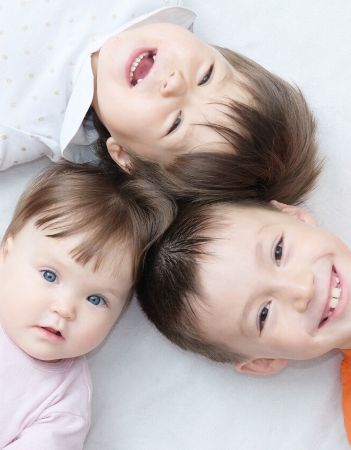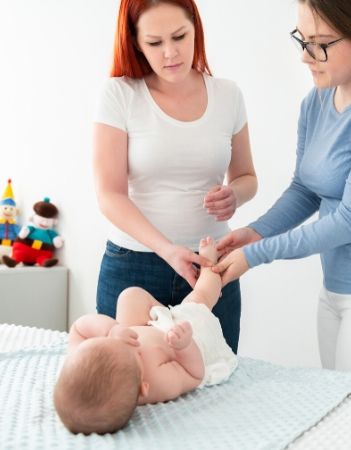Infant Therapy & Early Intervention
Feeding & Swallowing
Infants & Toddlers
Eating is both essential and social! Mealtimes should be nutritive for your child and enjoyable for all involved.
Communication & Connection
Infants & Toddlers
Your child communicates with you from birth! Communication occurs in many ways and we want to help you listen.
Gross Motor Skills & Play
Infants & Toddlers
Motor skills help your child eat, speak, play, and engage in self-care. There’s more to it than walking and talking!
Infant Therapy & Early Intervention
Start with a ConsultationFeeding & Swallowing
Infants & Toddlers
Eating is both essential and social! Mealtimes should be nutritive for your child and enjoyable for all involved.
We address:
- Misreading hunger cues
- Challenges with regulation
- Nipple pain/soreness (breastfeeding)
- Low milk supply (breastfeeding)
- Limited weight gain
- Long, inefficient feeds
- Fussiness, colic, GI discomfort
- Difficulty transitioning to table foods
- Picky eating
- Challenging mealtime behavior
Communication & Connection
Infants & Toddlers
Your child communicates with you from birth! Communication occurs in many ways and we want to help you listen.
We address:
- Difficulty understanding emotions
- Challenges with regulation
- Negative or unproductive interactions
- The aloof, unengaged child
- Behavior without purpose
- Limited vocabulary
- Maladaptive, compensatory behaviors
- Unintelligible speech
- Difficulty relaying information
- Limited play skills
Motor Skills & Play
Infants & Toddlers
Motor skills help your child eat, speak, play, and engage in self-care. There’s more to it than walking and talking!
We address:
- Limited stability
- Delayed motor milestones
- Long, inefficient feeds
- Minimal response to voice
- Limited play skills
- Challenges with body awareness
- Decreased sensory awareness
- Unintegrated early reflexes
- Limited coordination
- Dependence with activities of daily living
- Challenges with writing tools
- Limited mobility
Let our SPACE be your SPACE for early intervention
At SPACE, we specialize in the treatment of infants, and children with many kinds of developmental, neurological, and congenital issues. We aim to support growing families from many angles:
- Private nursing room, specialized flooring & lighting
- Online Therapy
- Certified Lactation Counseling
- Specialized programming such as Expectant Mothers and Mommy and Me classes
Our clinicians are highly trained through continuing education, specialized certifications and the development of individualized programming.
%
the number of typically developing infants with significant feeding problem
the number of new neural connections made every second through age 3
How SPACE Helps Infants
Online
Therapy
Specialized
Classes
 COMING SOON
COMING SOON
Certified Lactation Counseling
 COMING SOON
COMING SOON
%
the number of typically developing infants with significant feeding problem
%
the number of new neural connections made every second through age 3

Building Healthy Minds Starts At Birth (0-12 mths)
In the first years of a baby’s life, their brain has a tremendous ability to learn and create new neural pathways. At SPACE, we offer support during this crucial time to promote healthy development, intelligence, and emotional growth by using the DIRFloortime® Model and the six essential types of experiences!
- Promote communication and motor milestones
- Integrate activities that help baby use muscles to move his head, stick out tongue & move arms & legs
- Teach caregivers to woo baby into experiences that bring pleasure or joy
- Teach games and simple back and forth exchanges that promote motor, language, and cognitive development
- Support healthy eating
- Teach strategies that calms or alerts baby
- Empower parents – build confidence as relationships can change a child’s developmental path
Early Intervention for Ages 1- 3 Years
Between birth-3 years, a baby’s brain develops between 700-1,000 new neural connections every second.
Early intervention helps in the following ways:
- Enhances brain development
- Aids in meeting developmental milestones
- Can change a child’s developmental path
- Provides assistance & support for families
- May reduce the need for therapy later in childhood
- Positively impacts health, language, behavior
- communication and future academic achievement
Populations we support:
- Premature birth and birth Injury issues
- Genetic disorders
- Colic and Sleep issues
- Feeding challenges
- Torticollis
- Sensory issues such as not wanting to be held
- Tongue tie-lip tie, before and after release care


Developmental Milestones
Developmental milestones are the skills and age-specific tasks that most children can do at a certain age range. It’s important to understand how your child is developing so you can know when intervention might be needed.
Development goes beyond simply walking and talking to include cognitive skills, communication, motor, feeding, and social-emotional development.
BLANK:
6 Months
- Startles to loud noises
- Demonstrates differentiated cries based on state
- Attends to a speaker’s face
- Smiles or calms when spoken to
- Demonstrates eye contact
- Imitates oral movements
- Sucks fingers & mouths toys
- Engages in vocal play & babbling back & forth
- Works to reach a toy
- Demonstrates vertical munching
- Rolls in both directions
- Can prop sit and utilize protective responses
- Stays on tummy while lifting head 45 degrees
- Pulls up from lying on back into sitting
12 months
- Has a first word (ideally, two to six words)
- Responds to name
- Participates in back and forth interactions
- Uses gestures & vocalizations to gain attention
- Can drink from an open cup
- Understands 30-50 words
- Engages in reduplicated babbling (i.e. mama, dada)
- Responds to “no”
- Imitates simple actions of others
- Points to learn new words
- Laterally cruises at furniture
- Creeps on hands/knees (~9 months)
- Stands independently/walks with assistance
2 Years
- Chews a broad range of foods & textures
- Swallows with lip closure
- Engages in parallel play
- Engages in simple pretend play
- Acts on objects/toys within play
- Uses 50-100 words or more
- Uses two-word phrases
- Follows many one-step directions
- Asks questions
- Approximately 75% intelligible to familiar listeners & 50% to unfamiliar listeners
- Creeps up/down stairs (12-18 months)
- Squat to stand to retrieve objects
- Throws a ball overhand
- Walks up stairs, alternating feet (18-24 months)
3 Years
- Chews with stable, rotary jaw action
- Chews with lips closed
- Early developing consonants (i.e. /p,m,h,n,w,b/ are mastered)
- Uses up to 900 words
- Demonstrates orientation to self (i.e. name, gender, etc.)
- Maintains attention to one activity for up to nine minutes
- Follows directions of up to three steps
- Plays spatial & motor games with rules
- Enjoys listening to storybooks
- Takes turns in conversation
- Walks in an adult fashion (24-30 months)
- Jumps in place
- Kicks a stationary ball
- Stands on one foot without losing balance
What You Can Expect at SPACE.
Choosing an early intervention program is an important decision and needs to be the best fit for your family! Parents are integral members of their child’s treatment team and we believe in a partnership that involves effective communication, mutual respect, clear boundaries, and clearly defined roles. Our goal is to collaborate and communicate with you every step of the way.
Your First Visit
Our first goal is to always build rapport with you & your child so that a positive relationship begins to develop. The safer your child feels at SPACE, the faster progress will begin! Initial evaluation may include standardized assessments, clinical observations and a caregiver report.
Ongoing Treatment
Caregiver/Parent Training
Expect HOMEWORK!
Dyad or social groups
Collaboration with team members & outside professionals
Infant Therapy 'Toolkit'
DIRFloortimeⓇ
Sensory Integration
Certified Lactation Counseling
SOFFI™ Method
Reflex Integration
Your First Visit
Our first goal is to always build rapport with you & your child so that a positive relationship begins to develop. The safer your child feels at SPACE, the faster progress will begin! Initial evaluation may include standardized assessments, clinical observations and a caregiver report.
Ongoing Treatment
Treatment in a private room, classrooms, open gym, or outside
Caregiver/Parent Training
1:1 treatment
Dyad or social groups
Collaboration with team members & outside professionals
Infant Therapy ‘Toolkit’
DIRFloortimeⓇ
Sensory Integration
Certified Lactation Counseling
SOFFI™ Method
Reflex Integration
Let's Talk!
Questions? Comments? Give us a call or send us a message below! We’d love to assist you and your family find your SPACE at our SPACE.

